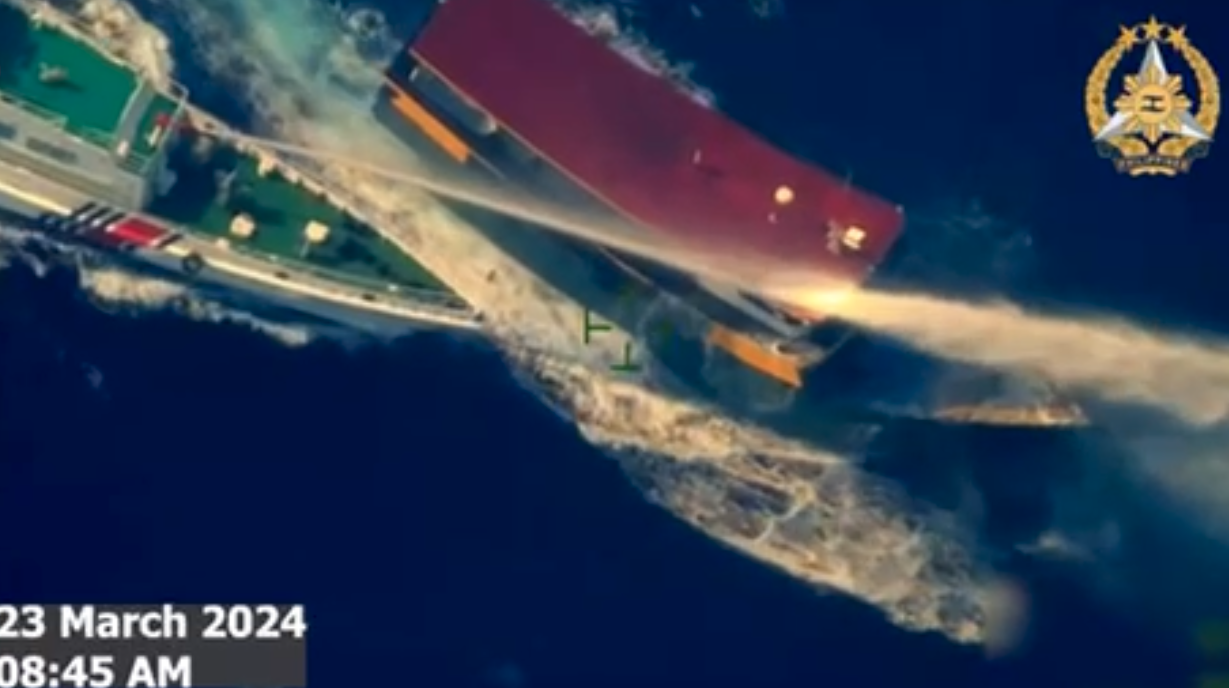China claim of manipulated resupply videos ‘a barefaced lie’ — FOCAP
Published March 27, 2024 5:28pm Updated March 27, 2024 5:51pm Manila-based foreign correspondents on Wednesday strongly denounced China’s allegation that local and international media outlets manipulated videos depicting Chinese harassment and assault of Philippine vessels off the South China Sea to support Manila’s claim in the disputed waters. The statement came after China foreign ministry […]


Manila-based foreign correspondents on Wednesday strongly denounced China’s allegation that local and international media outlets manipulated videos depicting Chinese harassment and assault of Philippine vessels off the South China Sea to support Manila’s claim in the disputed waters.
The statement came after China foreign ministry spokesperson Hua Chunying accused journalists invited by the Philippine Coast Guard (PCG) in missions to contested areas such as Second Thomas Shoal, locally called Ayungin Shoal, of resorting to “manipulate the videos they recorded to make sensational news and project the Philippines as a victim.”
The Foreign Correspondents Association of the Philippines (FOCAP), however, said it “strongly rejects and condemns the false, baseless claims by Foreign Ministry Spokesperson Hua Chunying and the Chinese Embassy in Manila” regarding the supposed altered videos and sensationalism.
“FOCAP takes deep offense at the insinuation that the press is a ‘troublemaker’ and in cahoots with the government to forward a political agenda,” the organization said.
“The claim that the Philippines ‘had [journalists] manipulate’ their footage is a barefaced lie,” it added.
Manila has renamed parts of the South China Sea that falls under its territory as West Philippine Sea.
In a post on X (formerly Twitter), Hua provided China’s positions and claims on the long-dragging territorial conflicts.
Her statement regarding the media coverage in the West Philippine Sea was in response to the question, “Who is the troublemaker?”
“Each time the Philippines delivered supplies to the grounded warship, they had many journalists on board and had them manipulate the videos they recorded,” part of her answer read.
Hua’s post on X was later on re-posted by the Chinese Embassy on its Facebook page.
GMA Integrated News is among the local media outfits that have joined several government missions to the West Philippine Sea upon the invitation of Philippine authorities.
“The statements by the Foreign Ministry spokesman and embassy are an insult to the integrity of journalists and an alarming attempt to muzzle an independent press,” said FOCAP.
“As part of the larger tradition of the free press in the Philippines,” FOCAP said it has “demonstrated its credibility in covering both domestic and geopolitical conflicts since its founding in 1974.”
“Members of FOCAP include both Filipinos and foreign nationals from around the world, some of whom have embedded in these Philippine missions,” FOCAP said.
In the latest incident in the contested waters, the Chinese Coast Guard used water cannons that caused heavy damage to the Unaizah May 4 — a charter supply boat operated by Philippine Navy personnel to deliver provisions and a new batch of forces onboard the grounded BRP Sierra Madre in Ayungin Shoal. Three Navy sailors were wounded in the incident.
China’s latest assault drew condemnations from Asian and Western states led by Philippine treaty ally, the United States, as well as Japan, Australia, and the 27-member European Union.
The BRP Sierra Madre serves as a Philippine military outpost and has become a symbol of Philippine sovereignty.
Ayungin is 105.77 nautical miles from the nearest Philippine province of Palawan and constitutes part of the country’s 200-nautical mile exclusive economic zone and continental shelf as provided under a United Nations convention.
The Philippines decided in 1999 to deploy a permanent station on Ayungin Shoal in response to China’s illegal occupation of Panganiban Reef, also known as Mischief Reef, a Philippine territory, in 1995.
“A free and independent press reports not what they are told, but what they observe, framed by historical and political context,” FOCAP said.
“The footage seen in the press is vetted by multiple sources and newsrooms. The work of journalists, including members of FOCAP and especially when carried by multiple media outlets, speaks for itself.”
“FOCAP will not be intimidated by threats and groundless attempts to smear its members’ reputation. We will continue to courageously cover developments and the impact of events in South China Sea and across the region.” — VDV, GMA Integrated News














